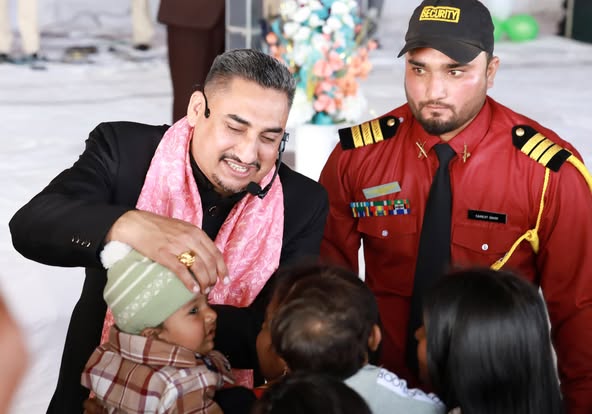This year, Christmas celebrations in the North Indian state of Punjab were unique due to the religious processions called ‘Shobha Yatras,’ usually limited to the Sikh and Hindu communities.
Often the target of hardliner groups, the Christian community also attended large gatherings on the roads and at venues. They were seen singing hymns in Punjabi while celebrating the birth of Christ.
Despite the peaceful celebrations and processions, sections of the media, political outfits, and hardliner groups expressed negativity and insecurity.
Christmas celebration leaves the hardliner groups fuming
Commonly, Punjabi society is known for its submissive nature. It has always welcomed people of other religions with open arms, but the rise of the Christian faith, the Pentecostal churches in particular, has left the hardliner groups fuming.
While the entire world was celebrating Christmas, the Christian processions in the Sikh-majority state of Punjab were called ‘unusual’ as the community, on paper, has just a presence of just two percent of the population.
Three Indian states—Nagaland, with an 87.9 percent Christian population; Mizoram, with an 87.2 percent Christian population; and Meghalaya, with a 74.6 percent Christian population—are Christian-dominated. Goa, Kerala, Tamil Nadu, Jharkhand, Odisha, Chhattisgarh, and Karnataka also have sizable Christian populations. Notwithstanding the numbers in other states, the celebration in Punjab caught the media’s and critics’ attention.
Interestingly, the Christmas Celebrations in Punjab were drenched in Punjabi culture and traditions. The people of the Christian faith brought out Prabhat Pharies ( processions), sang Punjabi hymns, and danced like the state’s traditional folk dance, Bhangra.
Indian media and politicians were worried about the growing influence of Christianity in the North Indian state of Punjab, where Sikhism happened to be the primary religion.
The size of the Christmas celebrations in Punjab was linked with the large-scale conversions among a particular community of Sikhs and Hindus, who are called Dalits (downtrodden).
According to the Christian clergy, the poor and Dalits of Punjab were converting to Christianity following the practice of casteism in the state.
“The Dalits were promised that they would be treated equally but were still untouchables and were not allowed to visit the shrines of upper castes. They were forced to construct their temples as they were discriminated against,” a Jalandhar-based Christian leader said.
The 2011 census data shows that Dalits comprised 32 percent of the state’s population, and the majority professed either Sikhism or Hinduism. Only 3.5 percent of Dalits own land in Punjab, and the remaining work as farm laborers with the upper castes, who own most land holdings. Till 2011, there were only 1.3 percent of Christians in Punjab, and their number was estimated at around 3,50,000. Sources say the number more than doubled during the past decade.
The rise of Christianity in Punjab :
The Punjabi Christian population has numerous denominations, including Eternal Light Missionaries, the Presbyterian Church, churches of North India, the Protestant Church, the Methodist Church, the Roman Catholic Church, and Pentecostal and Independent churches.
Pentecostal Church following is on the rise as they believe in holy spirits. There were allegations that the gullible Dalit population was being lured to impress Christianity in the name of blind faiths and spiritual treatment.
Interestingly, only a few Punjabi Christians belong to the upper caste- Sikhs and Hindus. The majority of the converted Christians are Dalits, who are usually discriminated against by the upper caste people.
Ironically, Punjab Christians continue to be Dalits in the government record as the state government offers them reservations in government jobs besides other sops. There is no reservation for the minority Christian community in Punjab or elsewhere.
Interestingly, the pastors who are promoting Christianity and belong to Pentecostal churches, in particular, are from the upper castes. While the Dalit converts adopt Christian names, the pastors from the upper castes continue to use their surnames to particularise themselves.
The names of some widespread pastures of Punjab are Ankur Narula from Jalandhar, Amrit Sandhu from Nawanshahar, Bajinder Singh from Kurali, Sukhpal Rana and Gurnam Singh from Ajnala, and Kanchan Mittal from Banur.
The newly constructed charges in Punjab resemble Hindu and Sikh temples where there are no benches, and the followers sit on the ground. Hymns are sung in the local Punjabi dialect.
Earlier, followers of other religions, like Sikhism and Hinduism, were tolerant and did not oppose Christianity. Still, anonymity between these religions and Christianity has increased over the years.
Nihangs, a Sikh community, vandalized a couple of churches in the Taran Taran district two years back, suspecting they were involved in conversions.
Punjab and Haryana High Court had also notified the Punjab government after the Christian bodies moved the court to seek protection from the goons.

